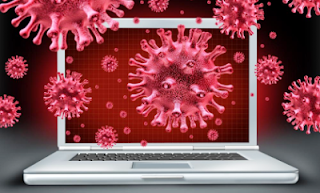Do you have plans on buying a computer (desktop, laptop, netbook)? If you have, then you better be warned that it could be carrying malware threats.
A Microsoft's study last December 2012 examined a total of 282 computers and DVD and found an average infection rate of 69 percent or a 6 percentage points higher than what originally estimated. Most of the PCs examined came from Indonesia, Malaysia, Philippines, Thailand and Vietnam.
The study also revealed that Philippines had 42 percent infection rate of pirated software, or two out of every five computers and DVDs tested were infected with malware. Vietnam appeared to have the highest rate with 66 percent malware discovered among pirated DVDs and 92 percent in hard drives.
"While the Philippines has the lowest rate of malicious software: at 42 percent, it doesn’t mean that we should put our guards down. Instead, we should continue to be vigilant against pirated software as it is not only discouraging local innovation but as the studies have shown, it is detrimental to office operations," said Atty. Ricardo Blancaflor, director general of the Intellectual Property Office of the Philippines (IPOPHL).
Microsoft's Security Forensics team also found that pirated copies of Windows embedded with malware were found in several PC brands, such as Acer, Asus, Dell, HP, Lenovo, and Samsung. However, Microsoft retorted that the counterfeit software or malware were not installed by the PC manufacturers. The computers were likely shipped with non-Windows OS, but were replaced with counterfeit software by retailers or other individuals involved in illegal activities.
"Many people assume that buying a name-brand PC is all that’s required to guarantee a good and safe computing experience. They don’t think twice about the software sold with the computer, and whether or not it’s pirated,” said Keshav Dhakad, Microsoft’s director of Intellectual Property for Asia Pacific and Japan.
"But consumers need to beware: while they might think there are great deals to be had by looking the other way, the hidden cost of pirated software is significant, and contrary to popular belief, can’t be remedied by simply running anti-virus software. If a consumer can’t verify that the computer they purchased was shipped with a pre-installed, genuine copy of Windows, their risk of exposure to viruses and spyware—and the potential for data corruption, theft, and financial loss—increases exponentially.”
In its tests in Southeast Asia, Microsoft found 5,601 instances and 1,131 unique strains of malware and virus infections, including the highly dangerous "Zeus" trojan.
Zeus is a password-stealing trojan known to use “keylogging” to monitor people’s online activity. Keyloggers record a user's every keystroke in order to steal personal information, including account usernames and passwords. This can be used by criminals to steal victims' identifies, withdraw money from their bank accounts, make online purchases using victim’s personal information and access other private accounts.
A Microsoft's study last December 2012 examined a total of 282 computers and DVD and found an average infection rate of 69 percent or a 6 percentage points higher than what originally estimated. Most of the PCs examined came from Indonesia, Malaysia, Philippines, Thailand and Vietnam.
The study also revealed that Philippines had 42 percent infection rate of pirated software, or two out of every five computers and DVDs tested were infected with malware. Vietnam appeared to have the highest rate with 66 percent malware discovered among pirated DVDs and 92 percent in hard drives.
"While the Philippines has the lowest rate of malicious software: at 42 percent, it doesn’t mean that we should put our guards down. Instead, we should continue to be vigilant against pirated software as it is not only discouraging local innovation but as the studies have shown, it is detrimental to office operations," said Atty. Ricardo Blancaflor, director general of the Intellectual Property Office of the Philippines (IPOPHL).
Microsoft's Security Forensics team also found that pirated copies of Windows embedded with malware were found in several PC brands, such as Acer, Asus, Dell, HP, Lenovo, and Samsung. However, Microsoft retorted that the counterfeit software or malware were not installed by the PC manufacturers. The computers were likely shipped with non-Windows OS, but were replaced with counterfeit software by retailers or other individuals involved in illegal activities.
"Many people assume that buying a name-brand PC is all that’s required to guarantee a good and safe computing experience. They don’t think twice about the software sold with the computer, and whether or not it’s pirated,” said Keshav Dhakad, Microsoft’s director of Intellectual Property for Asia Pacific and Japan.
"But consumers need to beware: while they might think there are great deals to be had by looking the other way, the hidden cost of pirated software is significant, and contrary to popular belief, can’t be remedied by simply running anti-virus software. If a consumer can’t verify that the computer they purchased was shipped with a pre-installed, genuine copy of Windows, their risk of exposure to viruses and spyware—and the potential for data corruption, theft, and financial loss—increases exponentially.”
In its tests in Southeast Asia, Microsoft found 5,601 instances and 1,131 unique strains of malware and virus infections, including the highly dangerous "Zeus" trojan.
Zeus is a password-stealing trojan known to use “keylogging” to monitor people’s online activity. Keyloggers record a user's every keystroke in order to steal personal information, including account usernames and passwords. This can be used by criminals to steal victims' identifies, withdraw money from their bank accounts, make online purchases using victim’s personal information and access other private accounts.


No comments:
Post a Comment